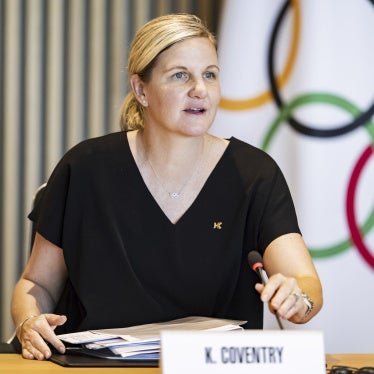Police should end investigations into the activities of two Ugandan human rights activists working in lesbian, gay, bisexual, and transgender (LGBT) communities, Human Rights Watch and the International Gay and Lesbian Human Rights Commission (IGLHRC) said today.
In violation of Ugandan law, the police held the activists, George "Georgina" Oundo and "Brenda" Kiiza for seven days, without bringing them before a judge or bringing charges against them. The two organizations called on Ugandan authorities to clear their police files and respect the basic freedoms of all Ugandans regardless of their sexual orientation and gender identity.
"Oundo and Kiiza are entitled to the same constitutional protections as all Ugandans, regardless of their sexual orientation," said Juliana Cano Nieto, researcher for the Lesbian, Gay, Bisexual, and Transgender Rights Program at Human Rights Watch. "The Uganda police must stop trampling on the rights of the Ugandan LGBT community."
Oundo and Kiiza were arrested on September 10, 2008, in Kiiza’s home in the village of Nabweru, outside Kampala. According to their lawyer, the police accused the two defenders of "recruiting homosexuals" – not a crime defined in the Ugandan Penal Code – and took them into custody. They were released on September 18, only after their lawyer threatened to take the matter to court. However, the investigation remains open and Oundo and Kiiza must report to the police on September 24. Meanwhile, police officials told the lawyer they will look for further evidence to bring the two to court.
Police violated article 23 of the Ugandan constitution by exceeding the 48 hour limit and by not bringing the activists before a judicial authority. Human Rights Watch and IGLHRC are deeply concerned that this mounting pattern of abuse – arrest, ill-treatment in detention, and then release – silences Ugandan human rights activists, including LGBT rights activists, through constant harassment.
Victor Mukasa, IGLHRC’s program associate for East Africa – himself a target of a police raid in 2005 and repeated harassment by some media in Uganda – said that "the illegal detentions of Georgina and Brenda make one thing abundantly clear – speaking out for LGBT rights is a risky business in Uganda."
According to the two activists, the police entered their home and confiscated magazines and books dealing with issues of sexual orientation and gender identity. At the Nabweru station, officers took their cell phones and copied down the names found in them. The officers questioned Oundo and Kiiza about other people the police accused of being homosexuals. The two said that the police repeatedly beat them with a baton during interrogation and denied them food.
These arrests are part of a pattern of police harassment of LGBT people in Uganda. On May 20, club bouncers in a Kampala bar beat Georgina and another transgender friend and took them to the Kabalagala police station. There, police detained them for four days without charge.
Police denied Oundo medical treatment for her diabetes. Other inmates sexually harassed her friend and officers repeatedly called her Malaya – a Swahili word for prostitute.
On June 4, Kampala police abducted an LGBT activist. According to the activist, the police took him against his will to an undisclosed location, where they subjected him to physical mistreatment as they questioned him about who funded and supported LGBT activities and his own role "among the homosexuals."
Article 9(3) of the International Covenant on Civil and Political Rights, to which Uganda has been party since 1995, states that "anyone arrested or detained on a criminal charge shall be brought promptly before a judge or other officer authorized by law to exercise judicial power and shall be entitled to trial within a reasonable time or to release." Article 23 of the Ugandan Constitution affirms that authorities can only detain a suspect up to 48 hours without bringing the accused before a judicial authority.
Background information
Homosexuality is illegal in Uganda and is condemned by high-level leaders. In July 2005, the Ugandan parliament passed an amendment to the constitution making this the second country in the world to outlaw marriage between people of the same sex.
Ugandan police have detained nearly a dozen LGBT people on charges related to homosexuality in the past five years. Authorities regularly harass LGBT human rights defenders in their homes and in public, and silence discussion of LGBT rights.
In June, three members of an organization defending LGBT rights held a peaceful protest at an AIDS conference in Kampala, drawing attention to the government’s refusal to respond to the pandemic among the country’s LGBT communities. Police promptly arrested them and charged them with criminal trespass. In 2005, government authorities fined a private radio station that broadcast a program on HIV prevention among men who have sex with men.
In July 2005, local government officers raided the home of Juliet Victor Mukasa, former chairperson of an LGBT rights organization, Sexual Minorities Uganda (SMUG). They seized documents and other materials and arrested another lesbian activist and held her overnight.
Buttressed by the official policy of the state, in August 2006, the tabloid paper Red Pepper published a list of first names, workplaces and other identifying information of 45 alleged homosexuals, all men. The paper claimed it was publishing the list "to show the nation ... how fast the terrible vice known as sodomy is eating up our society."







